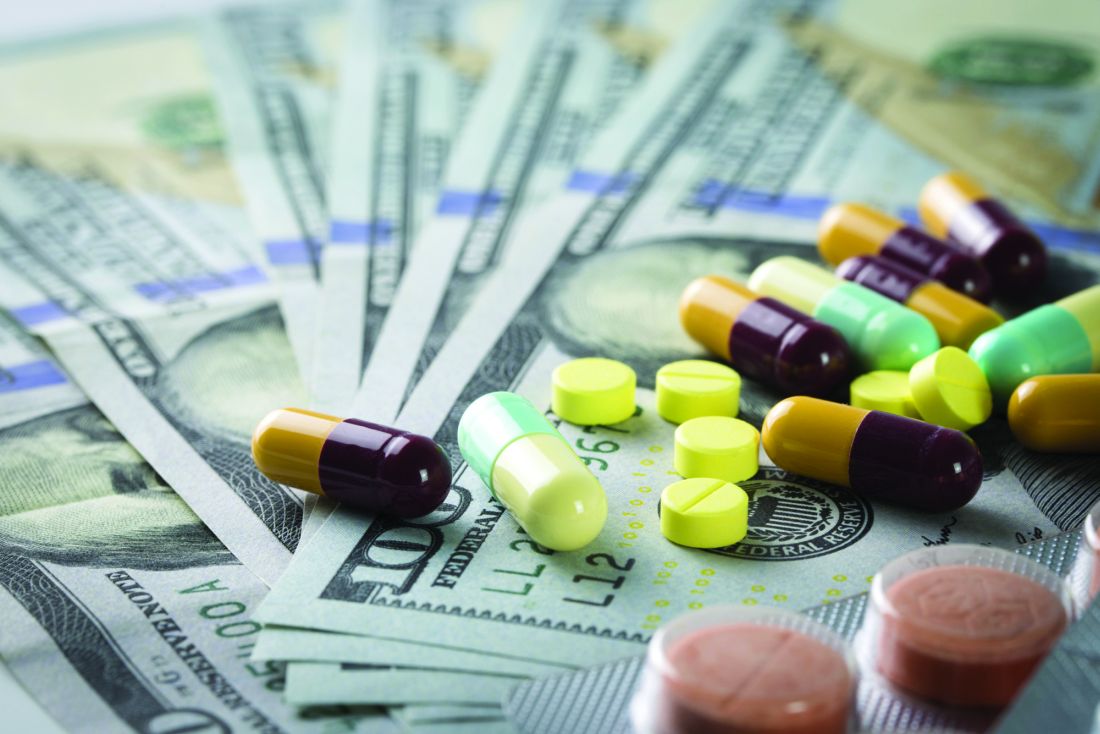User login
Management program improves adherence in specialty pharmacy patients
NATIONAL HARBOR, MD. – , according to research presented at the annual meeting of the Academy of Managed Care Pharmacy.
Patient management programs can help improve quality, satisfaction, and health outcomes for pharmacy patients, according to Brian MacDonald, PharmD, of Magellan Rx Management, and colleagues.
“The goal of a successful patient management program is to improve medication use and overall wellness, which can be achieved through patient engagement and empowerment,” they wrote in a poster presented at the meeting, adding that engaging patients can be a challenge.
Dr. MacDonald and colleagues analyzed claims data from January 2016 through April 2019 for more than 14,000 specialty pharmacy patients aged 18 years and older. Eligible patients – defined as those with at least one paid claim for a self-administered specialty drug in 10 eligible categories – were offered monthly coaching services via a patient management program. Baseline data were collected in 2016.
Over the course of the intervention, several changes were made to the patient management program in an effort to improve patient satisfaction.
Staffing was increased and priority was given to new patients. In addition, digital support tools were expanded, and staff engaged in continuous attempts to engage patients.
Patient engagement in the management program increased significantly from 21.6% in the baseline period to 33.4% during the intervention, and increased across all disease categories.
Patients eligible for the management program showed improved medication adherence, measured by the proportion of days covered, at 89.4% vs. 88.1% for ineligible patients. Further, a significantly greater percentage of eligible patients reached a target adherence of more than 85% over that same time period.
The investigators noted that a longer follow-up period may provide improved information on the impact of patient management programs on improved adherence and medical outcomes.
Magellan Rx Management funded the study. Dr. MacDonald and his colleagues are employees of the company.
SOURCE: MacDonald B et al. AMCP Nexus 2019, poster U11.
NATIONAL HARBOR, MD. – , according to research presented at the annual meeting of the Academy of Managed Care Pharmacy.
Patient management programs can help improve quality, satisfaction, and health outcomes for pharmacy patients, according to Brian MacDonald, PharmD, of Magellan Rx Management, and colleagues.
“The goal of a successful patient management program is to improve medication use and overall wellness, which can be achieved through patient engagement and empowerment,” they wrote in a poster presented at the meeting, adding that engaging patients can be a challenge.
Dr. MacDonald and colleagues analyzed claims data from January 2016 through April 2019 for more than 14,000 specialty pharmacy patients aged 18 years and older. Eligible patients – defined as those with at least one paid claim for a self-administered specialty drug in 10 eligible categories – were offered monthly coaching services via a patient management program. Baseline data were collected in 2016.
Over the course of the intervention, several changes were made to the patient management program in an effort to improve patient satisfaction.
Staffing was increased and priority was given to new patients. In addition, digital support tools were expanded, and staff engaged in continuous attempts to engage patients.
Patient engagement in the management program increased significantly from 21.6% in the baseline period to 33.4% during the intervention, and increased across all disease categories.
Patients eligible for the management program showed improved medication adherence, measured by the proportion of days covered, at 89.4% vs. 88.1% for ineligible patients. Further, a significantly greater percentage of eligible patients reached a target adherence of more than 85% over that same time period.
The investigators noted that a longer follow-up period may provide improved information on the impact of patient management programs on improved adherence and medical outcomes.
Magellan Rx Management funded the study. Dr. MacDonald and his colleagues are employees of the company.
SOURCE: MacDonald B et al. AMCP Nexus 2019, poster U11.
NATIONAL HARBOR, MD. – , according to research presented at the annual meeting of the Academy of Managed Care Pharmacy.
Patient management programs can help improve quality, satisfaction, and health outcomes for pharmacy patients, according to Brian MacDonald, PharmD, of Magellan Rx Management, and colleagues.
“The goal of a successful patient management program is to improve medication use and overall wellness, which can be achieved through patient engagement and empowerment,” they wrote in a poster presented at the meeting, adding that engaging patients can be a challenge.
Dr. MacDonald and colleagues analyzed claims data from January 2016 through April 2019 for more than 14,000 specialty pharmacy patients aged 18 years and older. Eligible patients – defined as those with at least one paid claim for a self-administered specialty drug in 10 eligible categories – were offered monthly coaching services via a patient management program. Baseline data were collected in 2016.
Over the course of the intervention, several changes were made to the patient management program in an effort to improve patient satisfaction.
Staffing was increased and priority was given to new patients. In addition, digital support tools were expanded, and staff engaged in continuous attempts to engage patients.
Patient engagement in the management program increased significantly from 21.6% in the baseline period to 33.4% during the intervention, and increased across all disease categories.
Patients eligible for the management program showed improved medication adherence, measured by the proportion of days covered, at 89.4% vs. 88.1% for ineligible patients. Further, a significantly greater percentage of eligible patients reached a target adherence of more than 85% over that same time period.
The investigators noted that a longer follow-up period may provide improved information on the impact of patient management programs on improved adherence and medical outcomes.
Magellan Rx Management funded the study. Dr. MacDonald and his colleagues are employees of the company.
SOURCE: MacDonald B et al. AMCP Nexus 2019, poster U11.
REPORTING FROM AMCP NEXUS 2019
Net prices of drugs rising four-times faster than inflation
NATIONAL HARBOR, MD. – The net prices of drugs are increasing four times faster than the rate of inflation, despite being offset 43% from list prices.
List prices increased by 232% from 2007 to 2018 (12% per year) and net prices increased 133% during that same time period. For Medicaid, the gross-to-net discount increased from 40% in 2007 to 68% in 2018. For all other payers, the increase was 22%-50% during that same period, Inmaculada Hernandez, PharmD, and colleagues reported at annual meeting of the Academy of Managed Care Pharmacy.
The investigators also found a wide variation on discounts across therapeutic classes. For example, list price for drugs in the multiple sclerosis category increased 407% over the study period while net price increased 221%. Insulins came in second in terms of gross price increases (337%) but saw only net prices increases by 83% due to increasing discounts, according to Dr. Hernandez, assistant professor of pharmacy and therapeutics at the University of Pittsburgh.
List prices for noninsulin diabetes treatments tripled during the observation period, but net prices went up only 24%. List price increases were lowest in the antineoplastic class, averaging 135%, though there were only 34% in rebates to offset the list price, resulting in an average net price increase of 89%.
Research was based on pricing data supplied by investment firm SSR Health for branded products and U.S. sales reported by publicly traded companies. The National Heart, Lung, and Blood Institute sponsored the study.
SOURCE: Hernandez I et a. AMCP Nexus, poster U2.
NATIONAL HARBOR, MD. – The net prices of drugs are increasing four times faster than the rate of inflation, despite being offset 43% from list prices.
List prices increased by 232% from 2007 to 2018 (12% per year) and net prices increased 133% during that same time period. For Medicaid, the gross-to-net discount increased from 40% in 2007 to 68% in 2018. For all other payers, the increase was 22%-50% during that same period, Inmaculada Hernandez, PharmD, and colleagues reported at annual meeting of the Academy of Managed Care Pharmacy.
The investigators also found a wide variation on discounts across therapeutic classes. For example, list price for drugs in the multiple sclerosis category increased 407% over the study period while net price increased 221%. Insulins came in second in terms of gross price increases (337%) but saw only net prices increases by 83% due to increasing discounts, according to Dr. Hernandez, assistant professor of pharmacy and therapeutics at the University of Pittsburgh.
List prices for noninsulin diabetes treatments tripled during the observation period, but net prices went up only 24%. List price increases were lowest in the antineoplastic class, averaging 135%, though there were only 34% in rebates to offset the list price, resulting in an average net price increase of 89%.
Research was based on pricing data supplied by investment firm SSR Health for branded products and U.S. sales reported by publicly traded companies. The National Heart, Lung, and Blood Institute sponsored the study.
SOURCE: Hernandez I et a. AMCP Nexus, poster U2.
NATIONAL HARBOR, MD. – The net prices of drugs are increasing four times faster than the rate of inflation, despite being offset 43% from list prices.
List prices increased by 232% from 2007 to 2018 (12% per year) and net prices increased 133% during that same time period. For Medicaid, the gross-to-net discount increased from 40% in 2007 to 68% in 2018. For all other payers, the increase was 22%-50% during that same period, Inmaculada Hernandez, PharmD, and colleagues reported at annual meeting of the Academy of Managed Care Pharmacy.
The investigators also found a wide variation on discounts across therapeutic classes. For example, list price for drugs in the multiple sclerosis category increased 407% over the study period while net price increased 221%. Insulins came in second in terms of gross price increases (337%) but saw only net prices increases by 83% due to increasing discounts, according to Dr. Hernandez, assistant professor of pharmacy and therapeutics at the University of Pittsburgh.
List prices for noninsulin diabetes treatments tripled during the observation period, but net prices went up only 24%. List price increases were lowest in the antineoplastic class, averaging 135%, though there were only 34% in rebates to offset the list price, resulting in an average net price increase of 89%.
Research was based on pricing data supplied by investment firm SSR Health for branded products and U.S. sales reported by publicly traded companies. The National Heart, Lung, and Blood Institute sponsored the study.
SOURCE: Hernandez I et a. AMCP Nexus, poster U2.
REPORTING FROM AMCP NEXUS 2019

